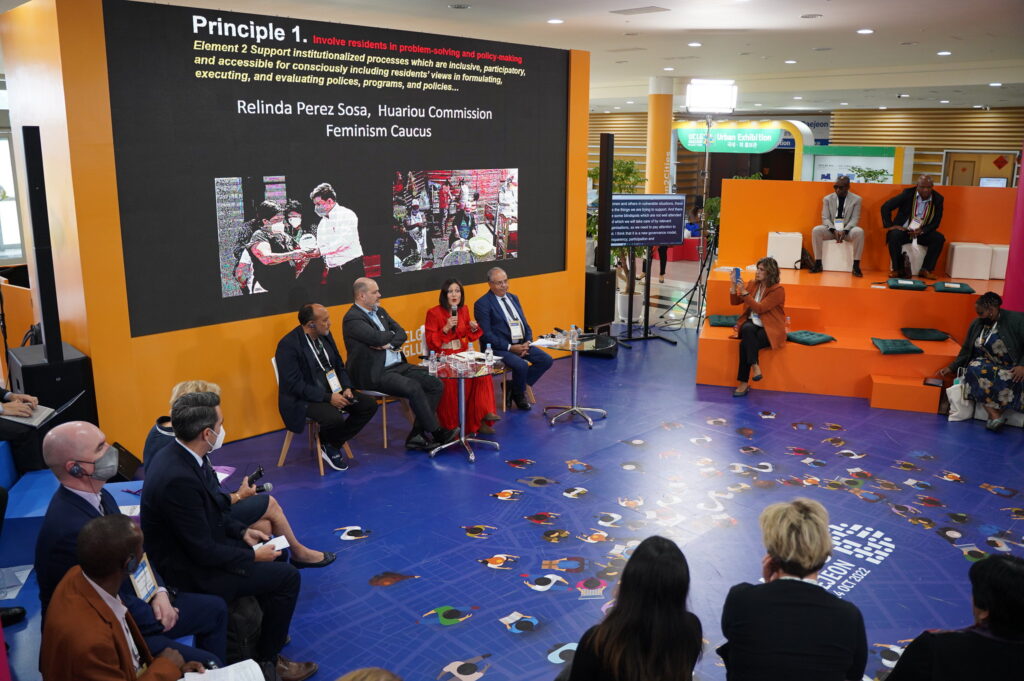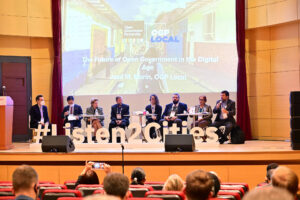The Future of Local Open Gov: Reflections from the UCLG Congress
El futuro del gobierno abierto local: reflecciones desde el congreso de CGLU
On October 10-14, the United Cities and Local Governments (UCLG) held its 7th World Congress in Daejeon, Republic of Korea. The Congress brought together representatives from local, regional, and national governments, civil society, academia and the international community to reflect on the current context and the role of local and regional governments in facing the challenges affecting their communities.
The Pact for the Future: The Daejeon Declaration is the key outcome document adopted by the UCLG Congress. With the Pact, local and regional governments re-state their commitmentOGP commitments are promises for reform co-created by governments and civil society and submitted as part of an action plan. Commitments typically include a description of the problem, concrete action... to take decisive action to tackle climate change, fight discrimination, guarantee human rightsAn essential part of open government includes protecting the sacred freedoms and rights of all citizens, including the most vulnerable groups, and holding those who violate human rights accountable. T..., and address inequality through fair and equal opportunities for all. It also acknowledges the important role a “well-informed, critical and empowered citizenship” will play in reimagining our future and the importance of a healthy civic space composed of “a free media, freedom of expressionJournalists and activists are critical intermediaries connecting public officials with citizens and serving as government watchdogs, and their rights and safety need to be protected. Technical specifi... More, agency and critical thinking”.
As a result, adherents to the Pact committed to “promote informed and sustained citizen’s participation in public life and decision-making promoting freedom of speech and conscience and artistic expression” and “foster open, accessible and verifiable information and data to promote inclusionOGP participating governments are working to create governments that truly serve all people. Commitments in this area may address persons with disabilities, women and girls, lesbian, gay, bisexual, tr... More, educationAccountability within the public education system is key to improving outcomes and attainment, and accountability is nearly impossible without transparent policies and opportunities for participation ... and communication.”
The Pact for the Future reflects the need for more open local and regional governments. In a session led by OGP Local, we discussed the future of open government in local and regional governments. This session highlighted the need for adopting ambitious commitments to restore trust between governments, people and the private sectorGovernments are working to open private sector practices as well — including through beneficial ownership transparency, open contracting, and regulating environmental standards. Technical specificat... More. We also explored the opportunities that proximity provides for greater impact of open government approaches and how an open government for all, includes adopting reforms that allow persons with disabilities to engage in public life as well.
Trust in the local sphere is important, and open government is an essential approach to rebuild trust. This was discussed at the town hall on trust and government, with specific examples of how open government approaches, like accessible participation spaces, timely and accurate public information, and effective accountability mechanisms, have contributed to restoring trust in many local and regional governments. At the town hall, the General Assembly of Partners (GAP), Fixed Africa, International IDEA, UN-Habitat, New York Office, and the Youth, Feminist, and Accessibility Caucuses together with OGP launched a new policy paper, which calls for a new social contract based on the principles of open government, among others. It also contains practical recommendations on open government reforms that can be adopted by local governments.

The UCLG World Congress brought local and regional governments together to sketch the vision for a brighter future for local communities. This can only be achieved by implementing innovative initiatives to tackle the most pressing issues faced by humanity. Among these initiatives, open government is key to renew trust, increase coordination and effectiveness, and tap into the collective intelligence of all citizens to find viable solutions. At OGP Local, we are seeing how over 100 local governments, along with civil society, are already taking up this challenge and implementing open government reforms as part of the path forward to a more equitable and sustainable future.
Del 10 al 14 de octubre, Ciudades y Gobiernos Locales Unidos (CGLU) organizó su séptimo congreso mundial en Daejeon, República de Corea. En el congreso se reunieron representantes de gobiernos locales, regionales y nacionales, la sociedad civil, la academia y la comunidad internacional para reflexionar sobre el contexto actual y sobre el papel de los gobiernos locales y regionales para atender los retos que afectan a sus comunidades.
El Pacto para el futuro de la humanidad: La Declaración Política de Daejeon es el documento resultante del congreso de CGLU. A través del pacto, los gobiernos locales y regionales refrendaron su compromiso de tomar medidas contundentes para luchar contra el cambio climático y la discriminación, garantizar los derechos humanos y reducir la desigualdad a través de la creación de oportunidades justas y equitativas para todas y todos. Además, reconoce la importancia de la “ciudadanía empoderada, crítica y bien informada” en la redefinición de nuestro futuro y la importancia del espacio cívico compuesto por “medios libres, libertad de expresión, agencia y pensamiento crítico”.
Como resultado, las partes que firmaron el Pacto se comprometieron a “promover una participación informada y sostenible de la ciudadanía en la vida pública y en la toma de decisiones, promoviendo la libertad de expresión y la conciencia y expresión artística” y “fomentar datos e información abiertos, accesibles y verificables para promover la inclusión, educación y comunicación.”
El Pacto para el futuro de la humanidad refleja la necesidad de gobiernos abiertos locales y regionales más abiertos. Durante una sesión liderada por OGP Local, discutimos el futuro del gobierno abierto en los gobiernos locales y regionales. Esta sesión resaltó la necesidad de adoptar compromisos ambiciosos para restablecer la confianza entre los gobiernos, las personas y el sector privado. Además, exploramos las oportunidades que ofrece la cercanía para un mayor impacto del gobierno abierto y cómo el gobierno abierto para todas y todos incluye la adopción de reformas que permiten a las personas con discapacidades participar en la vida pública.
En las esferas locales, la confianza es de suma importancia y el gobierno abierto representa un medio clave para reconstruir la confianza. Este tema se discutió en la asamblea sobre confianza y gobierno y se plantearon ejemplos de cómo las estrategias de gobierno abierto, por ejemplo los espacios de participación accesibles, información puntual y precisa y los mecanismos de rendición de cuentas han contribuido a restablecer la confianza en muchos gobiernos locales y regionales. En la asamblea, la Asamblea General de Socios (GAP por sus siglas en inglés), Fixed Africa, International IDEA, ONU-Habitat, la oficina de Nueva York y el Cáucasos por los jóvenes, las mujeres y la accesibilidad, en coordinación con OGP crearon un nuevo documento de política que hace un llamado a un nuevo contrato social basado, entre otros, en los principios del gobierno abierto.

Credit PlaceholderPHOTO: Credit: UCLG
El congreso mundial de UCLG reunió a gobiernos locales y regionales para definir una visión por un mejor futuro para las comunidades locales. Esto solamente será posible a través de la implementación de iniciativas innovadoras para atender los retos más urgentes que enfrenta la humanidad. Entre estas iniciativas, el gobierno abierto es clave para renovar la confianza, mejorar la coordinación y efectividad y aprovechar la inteligencia colectiva de todas y todos los ciudadanos para encontrar soluciones viables. Como parte de OGP Local, hemos visto que más de 100 gobiernos locales, junto con la sociedad civil, están aceptando este reto e implementando reformas de gobierno abierto como parte del camino hacia adelante hacia un futuro más equitativo y sostenible.


Leave a Reply